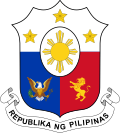| 6th Congress of the Philippines | |||||
|---|---|---|---|---|---|
| |||||
 | |||||
| Overview | |||||
| Term | January 17, 1966 – June 17, 1969 | ||||
| President | Ferdinand Marcos | ||||
| Vice President | Fernando Lopez | ||||
| Senate | |||||
| Members | 24 | ||||
| President |
| ||||
| President pro tempore |
| ||||
| Majority leader |
| ||||
| Minority leader | Ambrosio Padilla | ||||
| House of Representatives | |||||
| Members | 104 | ||||
| Speaker |
| ||||
| Speaker pro tempore | Jose M. Aldeguer | ||||
| Majority leader |
| ||||
| Minority leader |
| ||||
 |
|---|
The 6th Congress of the Philippines (Filipino : Ikaanim na Kongreso ng Pilipinas), composed of the Philippine Senate and House of Representatives, met from January 17, 1966, until June 17, 1969, during the first three-and-a-half years of Ferdinand Marcos's presidency.







